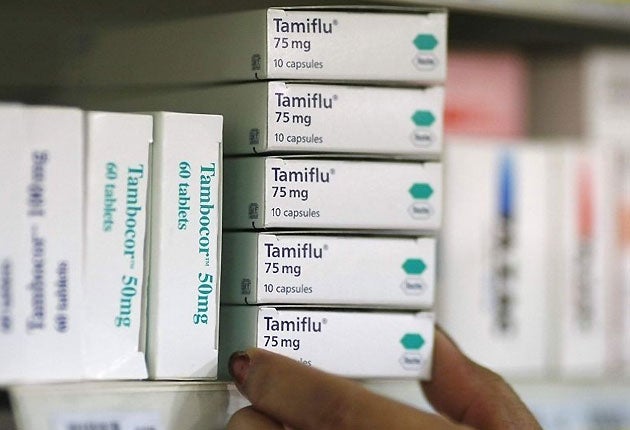Tamiflu researchers warn of child nightmares

More than half of children taking Tamiflu suffer side-effects such as nausea, insomnia and nightmares, researchers said.
Two studies from experts at the Health Protection Agency (HPA) showed a "high proportion" of British schoolchildren reporting problems after taking the anti-viral drug.
Data was gathered from children at three schools in London and one in the South West who were given Tamiflu earlier this year after classmates became infected.
The researchers behind one study said that, although children may have attributed symptoms that were due to other illnesses to the use of Tamiflu, "this is unlikely to account for all the symptoms experienced".
Their research, published in Eurosurveillance, looked at side-effects reported by 11 and 12-year-old pupils in one school year in a secondary school in south-west England.
The school was closed for 10 days in response to a pupil being confirmed with swine flu on return from a holiday in Cancun, Mexico.
A total of 248 pupils took part in the study and were given Tamiflu prophylactically.
Compliance with prophylaxis was high, with 77 per cent of children taking the full course, the researchers said.
But they added: "Fifty-one per cent experienced symptoms such as feeling sick (31.2 per cent), headaches (24.3 per cent) and stomach ache (21.1 per cent).
The researchers said "likely side-effects were common" and the "burden of side-effects needs to be considered" when deciding on giving Tamiflu to children prophylactically.
The researchers concluded that a "high proportion of school children may experience side-effects of oseltamivir (Tamiflu) medication.
Another study, also published by Eurosurveillance, looked at 103 children.
Of these, 85 took the drug prophylactically after a classmate was diagnosed with swine flu, with 45 experiencing one or more side-effect.
The most frequently reported side-effect was nausea (29 per cent), followed by stomach pain or cramps (20 per cent) and problems sleeping (12 per cent).
Gastrointestinal side-effects - nausea, vomiting, diarrhoea, stomach pain/cramps - were reported by 40 per cent of the children.
Almost one in five (18 per cent) reported a "neuropsychiatric side effect", such as poor concentration, inability to think clearly, problems sleeping, feeling dazed or confused, bad dreams or nightmares and "behaving strangely".
The research was carried out in April and May - before the Government decided to stop using Tamiflu prophylactically.
Only those with suspected or confirmed swine flu are now getting the drug.
The experts said clinical trials have shown that around 10 per cent of people taking Tamiflu report nausea without vomiting, and an extra 10 per cent experience vomiting.
A spokesman from the Medicines and Healthcare products Regulatory Agency (MHRA) said it was monitoring reported side-effects by GPs and the public.
Between April 1 and July 23, the MHRA received a total of 150 reports of 241 suspected side-effects for Tamiflu and five reports for another anti-viral, Relenza.
A statement from Roche, which manufactures Tamiflu, said the contribution of Tamiflu to neuropsychiatric events "has not been established".
A spokeswoman for the Department of Health said: "As is the case with many medicines, nausea is a known side-effect of Tamiflu, in a small number of cases.
"Symptoms may lessen over the course of the treatment, and it may help to take Tamiflu either with or immediately after food, and drinking some of water may also lessen any feeling of nausea."
The research comes after the Government said the number of swine flu cases "may have plateaued", with 110,000 new cases in England last week.
The data represent a 10 per cent rise on the 100,000 new cases estimated in the previous week.
The confirmed death total linked to the virus for England is 27 and 746 patients are also being treated in hospital.
Of these, 81 are in intensive care - up on the 63 in intensive care in the previous week.
Some 150,000 people have received Tamiflu via the National Pandemic Flu Service, which launched last week.
It is unclear how many of these people may also be appearing in the 100,000 data relating to new cases.
The Government said today that producing reliable estimates is "very challenging" due to the move from GP consultations to the National Pandemic Flu Service.
The start of the school summer holidays is also thought to be reflected in the figures, with a decrease in the estimated number of cases among children aged five to 14.
Government chief medical officer Sir Liam Donaldson said Tamiflu should still be given to children if they have established symptoms and there are no existing medical reasons not to prescribe the drug.
He told BBC Radio 4's Today programme: "All drugs do have side-effects. It is always a case of deciding the balance between benefiting a patient from a treatment and the side-effects.
"Most of the side-effects are relatively minor - a degree of nausea, a bit of a tummy upset, the sort of thing you get quite often with antibiotics."
He added: "If we look at the rate of admissions to hospital, it has been the under-fives who have had a very much higher rate of hospitalisation.
"It isn't common but when it does happen, it can happen amongst the youngest age groups."
Join our commenting forum
Join thought-provoking conversations, follow other Independent readers and see their replies
Comments